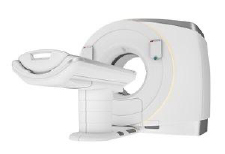Computed tomography (CT) is a diagnostic imaging test used to create detailed images of internal organs, bones, soft tissue and blood vessels.
The cross-sectional images generated during a CT scan can be reformatted in multiple planes, and can even generate three-dimensional images which can be viewed on a computer monitor or transferred to electronic media. CT scanning is often the best method for detecting many different cancers since the images allow your doctor to confirm the presence of a tumor and determine its size and location. CT is fast, painless, noninvasive and accurate. In emergency cases, it can reveal internal injuries and bleeding quickly enough to help save lives.
How long is a CT scan?
Most CT scans are completed in less than 20 minutes; including interview and prep time.
How should I prepare?
Wear comfortable, loose-fitting clothing to your exam. You may need to change into a gown for the procedure.
Metal objects, including jewelry, eyeglasses, dentures, and hairpins, may affect the CT images. Leave them at home or remove them prior to your exam. Some CT exams will require you to remove hearing aids and removable dental work. You may be asked to remove any piercings, if possible.
Tell your doctor about all medications you are taking and if you have any allergies. If you have a history of diabetes, kidney disease, or history of kidney surgery a blood test may be required before you come to your appointment.
Contrast
Depending on the reason for your exam, you may receive oral or IV contrast before and/or during your CT scan. In some instances, using contrast material will help the radiologist to diagnose any potential areas of concern. The contrast materials may not always be utilized and depend on the reasons for the exam. If you are to receive the injection, it would be given to you through an IV that the technologist will start when you arrive for your appointment. You may feel warm or flushed as the contrast is injected, have a metallic taste in your mouth and feel a need to urinate. All of these are normal and will subside quickly. You may also be asked to drink a Barium shake prior to or upon arrival.
If you have a known allergy to contrast material, your doctor may prescribe medications (usually a steroid and antihistamine) to reduce the risk of an allergic reaction. To avoid unnecessary delays, contact your doctor well before the date of your exam.
Children
For safety reasons, children are not allowed in the exam rooms. If you must bring your child, please bring someone to watch them in the waiting room.
Getting your results
Your physician will discuss the results with you or you may check the MyHealth portal for results.

